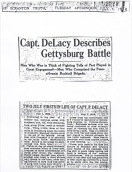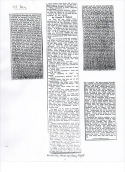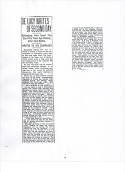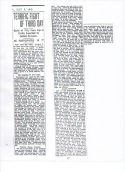The following excerpts appeared on July 1st through the 3rd, 1913, in the Scranton Truth, the Scranton, PA local newspaper. The Captain was interviewed about what had happened fifty years before in the Battle of Gettysburg. Click on the thumbnails to see the original documents.
THE SCRANTON TRUTH, TUESDAY AFTERNOON, JULY 1, 1913
Capt. DeLacy Describes Gettysburg Battle
Man Who Was in Thick of Fighting Tells of Part Played in Great Engagement- Men Who Comprised the Pennsylvania Bucktail Brigade
TWO JULY FIRSTS IN LIFE OF CAPT. P. DELACY
July 1, 1863
Sweltering in the heat of a blistery day, marches along with knapsack, gun, etc., from Emmetsburg along Pikes creek to Gettysburg. When within three or four miles of Gettys- burg hears the rattle of musketry. Marched double quick to the aid of the fighting troops. Sent with Com- pany A to skirmish in the valley below McPherson’s barn. Struck in the breast by shell, clothes torn from him.
Fights all day on empty stomach. Sees comrades killed on every side. Trapped by three Confederates 100 yards away from his regiment.
Bullet passes through coat sleeve, another nips thigh, a third strikes leg. Sleeps in the open, after eating crumbs of hard tack and piece of pork with bullet hole in.
July 1, 1913
Arises from his comfortable bed, at 6 o’clock to read story of Getty- sburg reunion, in Tribune Repub lican. Expresses sadness over his being compelled to miss encamp ment of veterans for first time, in forty-seven years. Gets out history of the Civil war and reads about the part played in historic struggle by the 143rd regiment. Eats hearty breakfast with linen napkin tucked in coat opening.
Views, with tears in his eyes the picture of Sergeant Ben Crippen color bearer of the regiment who was shot to death while waving his hand in defiance of the rushing Confederates. Sits in comfortable chair in his office and has memor ies of fifty years ago revived in a flood as he gazes upon the war photographs.
Alternating between the smiles and tears as he recited incidents that surged to mind during the recital, Captain P. DeLacy, Scranton hero at the first day’s fighting at the battle of Gettysburg fifty years ago today, gave his recollections of the scenes incident to the first day’s struggle.
Pride soared as he described the valiant stand of the boys of the 143rd Pennsylvania Volunteers in which he was the sergeant. It came again when he spoke of the cheering words that General Doubleday gave to the Pennsylvania boys and the answer that went back to the general and which caused him to wave his hat. Tears filled his eyes and his voice broke as he told of the incident just before the battlefield was reached, which sent the boys of the 143rd rushing at double quick in the blistering sun, heavily loded with knapsacks, guns, etc. This incident concerned the escaping of a family of five children from their home when the confederates rushed their early morning attack.
They are chasing our people from their homes. This was the message that went down the lines at the sight of the five as the horse they rode went crushing through the field. It was the electric spark that made the men easy to get into action.
I am weak and it makes me mad even now to think of those poor children fleeing from their home, said the captain as he brushed away the tears.
The tremor went from his voice a minute later as he told of the regiment passing General Doubleday. “What command is this?” shouted the general.
“The Pennsylvania brigade”, shouted back an officer of the regiment. This is the story of the first day as dictated by the captain:
By Captain P. DeLacy
On July 30 the 143rd Pennsylvania and other regiments of what was known as the Bucktail brigade were in camp at Emmettsburg. When the order to move north was given, only the superior officers knew the object. It is early on the morning of July 1, just fifty years ago this morning. It is a roasting day and the boys are becoming fagged as they troop along with knapsacks guns and other paraphernalia over their shoulders.
We are trooping along and sweltering when we hear the sound of artillery firing. We move faster and close to the field. Aides come dashing toward us shouting “Hurry up your columns.” Now we know the reason for the hurry up move from Emmettsburg. We hear the pounding of horses’ shoes coming across the field. On a baby horse flecked with foam are five children, the oldest about fifteen years. Each of the four back of him are clinging to the one ahead.
“My God, they are driving our people from their homes,” shouts one man away up in the line.
The cry goes down the line. Double quick is struck into before the order is more than half uttered by the officers.
A little way further we sight a man on horse back.
“It’s General Doubleday,” cries out one of our men.
“What command is this?” he shouts.
“The Pennsylvania Brigade,” he is answered.
“Pennsylvania, this day, go in for Pennsylvania,” he says.
Interrupting the cheer that comes from the men comes the shout: “We have come to stay.”
“Hold them boys when you get there,” he says.
“If we can’t hold them, where can you get men that can?” comes from a private in the ranks.
We are now hitting up a fast pace across the field. Men are stumbling and quickly recovering.
We reach the edge of the battlefield and learn quickly of the attack by the confederates. We also learn that the order to fire came from a Carbondale man, Captain Flynn, father of M. P. Flynn, of Scranton. Later I verified this.
We pass over the ridge at the seminary and into the flat valley facing McPherson’s barn. The fighting is getting fiercer in Reynolds’ woods. Our boys are itching to get into the struggle and when Company A gets the order to deploy in skirmish array, the boys of that company raise a cheer. We rush down the slope to Willoughby Run.
Captain Robert Crockett with thirty sharpshooters advances in front of us and begins an attack on the Rebels. When this attack is over there are only six of the sharpshooters left. Now we take up the fighting in earnest. We charge in fan-like fashion firing as we dash toward them. They pour volley after volley at us at four rods. Abraham A. Ide, of Tunkhannock, is down with a bullet in the side. Next falls Sergeant William Bennett.
Rushing toward me, shouting Billy is dead, Billy is done for comes Herbert M. Nogle, of Wisconsin.
Nogle chases back to where Bennett is lying. Picking him up on his shoulders, he rushes toward the barn traveling double quick amidst a storm of shot and shell. It’s a brave act and cheering him on, they fight Rebels and for twenty minutes they center the whole fire at us. Bullets are whizzing over our heads and shells are tearing by us. One strikes me in the chest and rips my clothes to shreds.
Jim Kelly comes to me. “Jim, the cartridge box and the Lord saved me this time” I said. Someone shouts that the flag of the 143rd regiment is in the field that the Rebels will soon have. Lieutenant Reilly and I make a dash for it. Major Cunningham shouts “Back to the line, you must stay with your company.”
Down the Chambersburg pike comes a troop of Rebels determined to drive us away. Attacking our right flank comes another. Rebels are scrambling over the fence and we are about to be caught in a trap. The order to retreat is sounded. We retreat, firing as we move. For three solid hours the enemy is pouring the musketry at us. Down the slope of the meadows is a rivulet. Here we make our stand.
Down the slope they come thundering. We fix our bayonets. Life never seems so sweet, nor so near the end. We have 300 men; they number thousands.
“Get you rebels”, shouts one of our boys. The others take it up. Instead of waiting for death, we rush up the hill. Startled by the sudden turn of the rats in their trap, the Rebels are stunned for the minute. We strike quick and hard. We rush them with bayonets. They begin to break group. In the attacking body of Rebels is the twenty sixth North Carolina of which much has been written. They scatter with the others.
Now we retreat after the enemy is in turmoil. We move along through the orchard and in the direction of the town. I see a man suddenly crumple up and fall dead. Blood spurts onto my clothes as I pass. I realize a minute later that he is the color bearer. I turn the body over and get the flag. It is the flag of the 150th regiment, later recovered when Jeff Davis was captured, he having kept the blood-covered flag as a prize trophy.
I am nearly famished with hunger and my lips are almost cracking from thirst. I find a small stream and am about to take a drink when I notice a soldier’s head touching the water. He is dead, with the head only hanging by shreds. As I start to rejoin my regiment which is about 100 yards away, I hear the cry, “Halt, you Yankee”. Determined not to be captured, I wheel and shoot at the man in the middle. Three shots come in return and I sprint with blood pouring from two wounds.
Reaching the town a number of us, back from the regiment, break a high board fence and escape a trap. We head off the brigade. Two guns are sending shrapnel down the street. I grab the horse of Colonel Dana and arrange for sending the men across the street between discharges from the two guns not a man being struck.
From my knapsack I get crumbs of hardtack and a piece of pork that has a bullet hole in it. Lieut. Reilly and I share the lunch. Then I retire to get the best sleep that has ever come to me.
THE SCRANTON TRUTH JULY 2, 1913
DE LACY WRITES OF SECOND DAY
Gettysburg Hero Spent This Day Fifty Years Ago Resting After Hard Battle.
WRITES TO HIS COMRADES
Expressing regrets over his inability to attend, it being the first encampment in forty-seven years that he has been away from “the boys”, Captain P. De Lacy, one of Gettysburg’s heroes wrote a long letter to the headquarters of his regiment on the battlefield today.
He told “the boys” that he couldn’t stand the excitement because of a recent illness, which physicians say was due to a wound he suffered during the first day’s fighting at Gettysburg fifty years ago.
There was no great activity among the boys of the 143rd Pennsylvania regiment of which the captain was sergeant during the second day’s fighting, fifty years ago today. His review of this day follows:
BY CAPTAIN P. DE LACY
On the night of July 1, Lieutenant Reilly and myself had watched the batteries in action before we went to sleep. Just before sleep came I expected that the morrow would find us again in a bitter struggle. Shortly after 6 o’clock on July 2, there comes the call of the bugler and we begin a scurry for something to eat. There is hardly a man in the regiment who has had much more than crumbs of hardtack since the morning before. Men are going from one to another begging for something with which to stave off the pangs of hunger. And comrades are unable to aid them. The wagons of food are away off and there is no hope of them reaching us very soon. Lieutenant Reilly and I forage around but like others we fail to find anything to eat.
“I am near dead for something to eat, isn’t there any way we can manage to scrape something together?” Reilly asks me.
We hear the tramp of feet and sight troops coming up from the south. Famished, we run among the newcomers and beg for hardtack. It is handed out to us, enough of it to relieve us. We are stationed on Cemetery ridge and ready any minute to get into the thickest of the fighting. An order comes that we are to hold our place and remain in reserve. The lieutenant and I go among the boys of the regiment learning the dead and wounded of the previous day. I learn of a small boy in my company having lost his life. His head had been blown off by a shell. He was a great little friend of mine and every time I have gone to Washington, I have visited his grave in Arlington cemetery.
The Rebels have captured two of our guns and the order comes for us to take them. It is only a skirmish but it is lively while it lasts. Finally we regain the guns. For the remainder of the day we hold our position expecting every minute to receive the orders that will send us into the fighting again. As the hours go by and we are not called into service, we lie on the field and rest so that we may be in proper trim when the call does come. The weather is very hot. There is fighting going on all day, but the feeling among the boys is that it will be some time, perhaps hours; perhaps a day or two before there comes another gigantic struggle. Not knowing what the morrow may bring forth and expecting that lively action will fall to our lot, we seek rest when night time comes.
THE SCRANTON TRUTH JULY 3, 1913
TERRIFIC FIGHT OF THIRD DAY
Battle of Fifty Years Ago Is Vividly Described by Captain De Lacey
HE PARTICIPATED IN IT
Fifty years ago today, Captain P. De Lacy, one of the heroes of that battle who won the Legion of Honor medal during the battle of the Wilderness, participated with the 143rd regiment, of which he was sergeant in the battle of Gettysburg. After the regiment had poured shot and shell into the line of the advancing enemy on the third day, it took up the role of spectators, being compelled to cease firing because of Vermont regiments passing in front of it to take position in the defending line.
From a point of vantage the captain witnessed the terrific struggle which ended with the Confederates retreating. His story of the third day’s fighting, as given to a Truth reporter, follows:
By Captain P. DeLacy
Throughout our ranks on the night of the second day came reports of new regiments coming to reinforce the Confederate army. Pickett’s division of Longstreet’s army bringing freshness to the jaded army of rebels was on the way, it was said. When sleep came there was not a man in the 143rd who wasn’t expecting the most spectacular battle to come either on the morrow or the following day. All sorts of reports were coming to the camp on the hillside and there wasn’t a man among us who didn’t expect to be plunged into the fiercest kind of fighting before another twenty-four hours. Morning dawns, and with it comes activities among the two forces.
There is going to be a battle. This becomes certain now. We are going to make an attack-this spreads through the forces of the North. Again there comes the report that the Southern troops are planning to make an effort to sweep the field. The latter appears most likely. We are occupying a good place for the witnessing of any fighting there may be along Seminary ridge. Regiments on the sides of us are being primed for the battle. The Confederate artillery begins to open fire on the front of the Northern battle line. Our batteries extending from Cemetery ridge to Round Top began to answer back. The firing becomes more incessant. Trees are shaking, the ground is being rooted up, shells are exploding in the air, there is a storm of scrap iron. Between the batteries are brushes [bushes] and they are waving forward and back as the shells come whizzing through the air. The smoke envelopes the field. The ground appears to be trembling. Every minute the racket is getting worse. It is hard to understand why men can live and fight with such death-sounding missiles coming pell-mell through the air.
Comrade Cheers Comrade
We are in the midst of the battling and no man seems to mind. Comrade is cheering comrade while there is time. Men are swearing and we can hear from across the valley, the rebel yell. We answer the yell with a cry of our own. Lines of skirmishers are skulking along and firing as they advance or retreat. One doesn’t hear any cries from the wounded. Only a muffled roar of yells and cries intermingling with the terrific report of the batteries now working at high pitch with the din increasing with every series of shots. It is more than noise. Men are falling, dead and wounded.
Now comes the advance of the Rebs. Their yell is louder. They appear determined to do or die. The order to advance has apparently been sounded down their line. Now comes Pickett with his veteran fighters. There are fresh troops among the invaders. They are the men of Pickett’s. They seem unafraid as they advance toward the Northern lines. They are Virginia boys. We have been hearing about their valor and their courage. Now we are going to see them put to the iron test. We are firing as fast as we can and fairly riddling one of the detachments of that magnificent line. We keep up pelting at this force. I can see no end to the right nor left to the line that is coming. Skilled troops on parade could not hold an alignment of line better. It is a picture that makes man wonder at men being able to hold together in such form amidst such terrible havoc in their ranks. There is praise for those men, from the boys in blue. One says “great” and “fine” without even a thought of pity for the deaths that are coming to those brave men as they advance by order of their commanders. Men are being mowed down with every step. And men are stepping into their places. There is no dismay, no discouragement, no wavering. It grows in magnificence as death’s sting waxes stronger. Now they are in double quick stride. And we answer their spurt with more shot and shell. Our regiment gets the order to cease firing. Vermont regiments are passing just below us, ranging into the defense line. The officers of these regiments, fearful that our shots will find marks among those boys shout to us on the hillside to stop firing. The command then comes to us from our officers.
Become Spectators
Now we are spectators, viewing a scene that seldom comes to a man in a lifetime. Many of us are lying flat on the ground. Others are squatting. Some are standing until the order to drop comes from the officers. Shot and shell are passing over us and among us.
Fearful gaps are being torn into the ranks of the approaching thousands. Shrapnel and case are being used. But there is nothing on earth that can stop that advance just yet. The Virginia boys with the boys of South Carolina, North Carolina, Tennessee, Alabama, Georgia and Mississippi appear as determined as ever. There is no telling what the end may be. The spectacular features is being furnished by the Rebels. But the Northern forces are doing most of the fighting. They are holding their line. A break is made in one part of the line when some of the defenders run out of ammunition. But what good is this going to be if they cannot pierce the entire line and hold their position. We have nothing to do for a while. Our future activities are going to depend upon the success that attends the efforts of our boys on the line to repel the attack and prevent punctures.
The clash now comes. The Vermont boys and the other boys refuse to yield an inch. Men are now fighting within feet of each other. Muskets are being used as clubs. On the hillside we are cheering like mad. “Give it to them” we cry, waving our hats. Their Rebel yell has died out to a mere sing-song. Now they are giving way and we are cheering and cheering. The Rebels attack is over. They are retreating. The battle of Gettysburg is about over. The target of 15,000 men that General Lee had put before the fire of 20,000 rifles is melting away fast on the way to the Potomac. If we had a Sheridan now, there would be another star made. But Meade has more caution. We have heard reports that the battle with Lee’s force was practically forced on him by his generals. He is satisfied and feels that it will be better to allow the retreat of the Rebels and meet them again in the southland. The battlefield is strewn with dead and wounded and there is work for us all this night.



